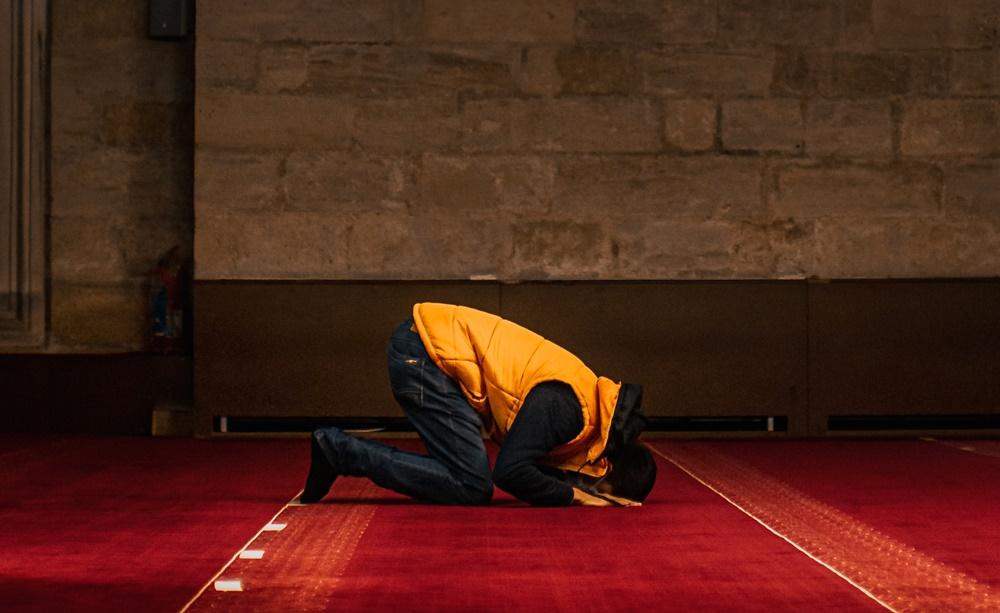Respect, reverence and love of Allah’s Messenger (ﷺ) is an essential part of faith, for he stipulated: “No one of you is a believer until I am more beloved to him than his parent, his child and all people.” But our love for the Prophet is naturally on a different plane and of a different type than that for others of the human race. This is because our debt to him is far greater than to others, and it was he who was chosen by Allah to deliver the divine message, to invite all people to His religion, and to show them the path leading to His acceptance and pleasure. He spared no effort and no sacrifice in carrying out this duty for the benefit of mankind. Through Prophet Muḥammad (ﷺ), Allah made known truth from falsehood, guidance from misguidance, and wisdom from error. And through him, He showed man how to attain eternal Paradise.
The ṣaḥābah readily demonstrated their love of him by complete obedience and by defense of his person and his sunnah after him. These expressions of fidelity have never been doubted and are as valid today as ever before, remaining obligations upon every Muslim believer.
However, other expressions of affection and attachment to the Prophet (ﷺ) have come into being since that time. Although the community eventually sank into a long period of stagnation and ignorance, the ordinary Muslim seldom lacked enthusiasm and sincerity; what he lacked was knowledge and upright leadership. Conflicting opinions on the subject have led at times to disputes, which in some cases have transgressed the limits of what is lawful in speech and behavior among Muslims. Believers have the right to differ as long as they fear Allah, respect each other and sincerely seek the truth from legitimate sources of Islamic jurisprudence, putting aside personal preference and preconception.
What Is the Mawlid?
The original Arabic definition of the word “mawlid” is “a place of birth or a time of birth.” This is the only definition known to Muslims from the time of the Prophet until the beginning of the fourth Hijrah century. After that, the term took on another meaning – the gathering of people for the purpose of listening to specific recitations culminating in the story of the Prophet’s birth. Nowadays in some countries, the 12th of Rabī‘ al-Awwal, considered to be the day of birth, is a national holiday. Moreover, the mawlid ceremony is no longer confined to the day or month of the Prophet’s birth but is often held on other happy occasions, such as the birth of a baby, a marriage agreement or relief from some distress, as a kind of thanksgiving in appreciation for Allah’s favor.
The ceremony is often not exempt from forms of shirk in varying degrees, such as the excessive praise in which certain divine characteristics are attributed to the Prophet (ﷺ), while the Messenger (ﷺ) himself warned: “Do not praise me exceedingly as the Christians praised the son of Mary. I am only His servant, so say, ‘the servant of Allah and His messenger.'”
Unfortunately, in some parts of the world where ignorance is still widespread, these excesses are so extreme as to include supplication directed to the Prophet himself or the dedication of sacrificial animals to him. Such manifestations are admittedly due to those peoples’ sincere affection for the Prophet (ﷺ) and for Islam. But lacking adequate knowledge of their religion, they often fall prey to the unscrupulous, who, posing as spiritual leaders, seek to insure popularity through propagation of that which the people already like and accept unquestioningly.
Putting deliberate misguidance aside, however, we may also note that there are a large number of relatively educated Muslims and some Islamic scholars who condone the more moderate form of mawlid celebration as being, if not praiseworthy, at least preferable to the many types of worldly entertainments and empty pastimes to which the masses of common people are normally attached. Even when conceding that the practice is not a part of the sunnah which has come down to us from the Prophet, they see no harm in observing the occasion of his birth or attending a mawlid as long as it is free from expressions of shirk or other unlawful aspects. And finally, there is the claim that all things are ḥalāl (permissible) unless they are specifically forbidden in the Qur’ān or the Sunnah, by people who forget that this applies to the worldly aspects of daily life and not to religious practice which was perfected and completed by Allah ta‘ālā, who said:
“Today I have perfected for you your religion and completed My favor upon you and am pleased with Islam for you as a religion.”
Quran 5:3
Since Allah has perfected the religion, it cannot be claimed that further additions to it are beneficial or even allowable, for that is a contradiction of the Qur’ān and a statement of unbelief. In the words of Imām Mālik: “Whoever innovates an innovation in Islam and considers it good has claimed that Muḥammad (ﷺ) betrayed the Message, because Allah said, “Today I have perfected for you your religion…” Similarly, Ibn Taymiyyah declared, “One who goes beyond what the Prophet (ﷺ) has made legitimate as religion and worships through an innovation has not, in fact, born witness that Muḥammad is the messenger of Allah.” “And generally, the believer must know that the Prophet left nothing which draws one nearer to Paradise except that he spoke of it.”
Ibn Taymiyyah also pointed out that anyone who claims an act to be obedience to Allah or a means of becoming close to Him must produce evidence of this, just as one who claims that something is ḥarām (prohibited) must produce evidence. For nothing is prohibited except what Allah has prohibited, and nothing is religion except what Allah has made religion, since He neither forgets nor fails in what He wills.
Valid evidence must come from the Qur’ān, the authentic Sunnah or those secondary sources of Sharī‘ah derived from them. As for arguments based upon weak or forged ḥadīths, supposition without proof, dreams, personal opinions and the like – these are all unacceptable and invalid as sources of religion. In the words of Allah ta‘ālā:
“Then what can be beyond the truth except error.”
Quran 10:32
When going back to the writings of early scholars, including the founders of the four well-known schools of Islamic jurisprudence, we find them adamantly and consistently in opposition to all forms of innovation in religion, condemning the various deviations which in their times had crept into the Muslim’s understanding of certain aspects of worship.
How Did It Begin?
The mawlid ceremony was first introduced by the Fāṭimid rulers of Egypt in the fourth century of Islam. They were a deviant sect adhering to secret doctrines, and were known for their heresies and open unbelief, not to mention a host of religious innovations. It has also been reported that the mawlid was first celebrated in the region of Mosul by the king, al-Muthaffar in the year 625 H. He gave a generous prize for a composition entitled at-Tanweer fee Mawlid il-Basheer in-Nadheer. The king prepared extravagant feasts and personally joined the sūfīs in whirling dervish dances.
Thus, it is clear that the mawlid ceremony was not practiced or even known by the Prophet (ﷺ), the ṣaḥābah (his companions), the tābi‘een (their students) or the general body of Muslims before the fourth century after Hijrah. The yearly celebrations spread rapidly among people who had succumbed to the blind imitation of others. Thus, the mawlid, along with other innovations, found its way into the community and became part of the “religion” of a vast number of Muslims.
The Way to Allah’s Acceptance
The Creator of man did not leave him without guidance. He said in the Qur’ān:
“And this is My path which is straight, so follow it and do not follow other ways, for you will be separated from His [i.e., Allah’s] way.”
Quran 6:153
So any act performed with the sincere intention of drawing nearer to Allah must first be one prescribed by Him, either through His Book or through His final Prophet (ﷺ). Then it must be done in the way demonstrated or instructed by the Messenger of Allah. The proof of this is in a ḥadīth in which the Prophet (ﷺ) declared: “Whoever does a deed not in accordance with our affair [i.e., practice] – it is rejected.”
This rejected deed is termed a bid‘ah (innovation or invention), and denotes everything which was not part of the religion by which Allah was worshipped at the time of the Prophet and his companions and was neither prescribed by Allah in His Book nor through His Messenger. Allah’s Messenger (ﷺ) warned: “Beware of newly devised affairs [in religion], for every new thing is a bid‘ah [innovation] and every bid‘ah is misguidance.” And he said: “Verily, the best speech is the Book of Allah, and the best guidance is the guidance of Muḥammad; the worst of affairs are the newly devised ones, and every bid‘ah is misguidance.”
And Allah warned in the Qur’ān:
“Let those beware who are at variance with his affair [i.e., the way of the Messenger] lest fitnah strike them or a painful punishment.”
Quran 24:63
The Prophet (ﷺ) directed men to countless ways of earning the pleasure of Allah. Precision in work, assistance to others, raising children well, teaching, learning, numerous small kindnesses and charities, honesty, courage, patience and self-control – all of these are legitimate forms of worship rewarded by Allah when dedicated to Him. Does it then stand to reason that one should discard any of these many opportunities in preference for a pastime void of blessing?
There is nothing to prevent Muslims from seeking pleasure in lawful activities, from gathering to eat, talk and enjoy themselves. For those who like to hear the Prophet’s seerah, a serious study of its contents would be far more rewarding and beneficial. An assembly of dhikr patterned upon those of the ṣaḥābah would be one in which knowledge is gained and which has a lasting effect on the participant, increasing him in righteousness. And as for feeding the poor, what is to prevent the well-to-do Muslim from drawing nearer to Allah by this kind of ṣadaqah whenever the opportunity arises rather than waiting for a special day or season? And what is to prevent him from eating and drinking himself, enjoying Allah’s blessings and thanking Him every day of the year?
If one’s pleasure is derived from the coming of Muḥammad (ﷺ) into the world as a mercy to mankind bringing guidance from Allah, then it must be a continual pleasure manifested in thankfulness to Allah and faithful obedience to His Messenger (ﷺ) at all times and in all circumstances. Thus, one becomes a genuine follower of the Prophet (ﷺ), loving him in truth and in fact – not merely in speech and in song.
If, however, one considers that the day itself is an occasion of happiness, it should be remembered as well that this day, 12 Rabī‘ al-Awwal, is confirmed to be the day of the Prophet’s death, an event beside which the ṣaḥābah found all other disasters light in comparison and could not possibly have celebrated.
Advise Others Judiciously
Allah guides whom He wills to the Straight Path. And as the Messenger of Allah (ﷺ) stated: “There shall remain a faction of my community clearly [standing] on the truth. They will not be harmed by those who forsake them until the decree of Allah comes.” But we need to remember that usually, support for the mawlid stems from devotion to the Prophet (ﷺ) and the assumption that the ceremony is rooted in Islam. No Muslim should disrespect another or accuse him of shirk or kufr for taking part in an innovation, for this is far more serious than the practice in question. He should advise his brother gently, for harsh manners often produce negative reactions of obstinacy and arrogance.
As for those Muslims who are not yet convinced, they are reminded not to say of their brothers who disapprove of the mawlid as an innovation, “They do not love the Messenger of Allah,” for this also is an implication of unbelief as well as a false statement. On the contrary, none would advise against innovation and defend the Prophet’s Sunnah except one who does so for the cause of Islam and the benefit of Muslims, performing his duty in obedience to the Prophet himself (ﷺ), who said, “Whoever of you sees something objectionable, let him change it by his hand, and if he unable, then by his tongue, and if he is unable, then in his heart – and that is the least of faith.”
Let us all beware of excess and intolerance of our brothers, strive for Allah’s reward, fear His displeasure and ask Him to guide us concerning that in which we have differed to what is right.
والحمد لله رب العالمين








 Dr. Bilal Philips
Dr. Bilal Philips